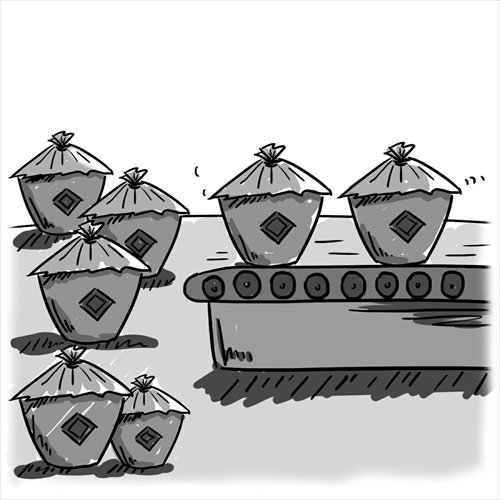HOME >> BUSINESS
Imports stir anxiety but meet China’s food needs
By Geoffrey Murray Source:Global Times Published: 2014-2-24 21:23:01

Illustration: Chen Xia/GT
Import liberalization seems the only logical way for China to meet its growing food needs, but it's causing anxiety at home and abroad after years of near domestic self-sufficiency.
This is particularly true with grain, the US Department of Agriculture reporting a near doubling of Chinese imports in 2013 to 22.8 million tons.
A familiar name, Lester Brown, president of the Earth Policy Institute, has weighed into the debate, claiming growing Chinese demand will "place new strains on world food supply already stretched to the limit." It's an old refrain similar to his question "Who Will Feed China" posed in 1995. For a long time, the answer was: China.
One of the great Chinese success stories has been how the government was able to overcome the acute shortages of early years and adequately feed a huge population by itself despite overall shortages of arable land and water. Nobody now wants to see China's growing appetite lead to it being held hostage by foreign grain suppliers.
Domestically, corn and maize currently create fears their imports could follow the trend of soybean where foreign supplies dominate the domestic market.
The country became a net importer of corn as recently as 2010, with the US now supplying 90 percent. The trade tends to be handled by private companies, whereas other commodities like wheat go through State-owned channels.
How has this come about?
To create a well-off society and eliminate a widening urban-rural income gap, the government has been promoting urbanization. Tens of millions of peasants flocking to the cities want a better diet like the fast-growing urban middle class.
Traditionally, pork has been the meat of choice, but demand is switching to chicken and beef; the latter, in particular, needs a huge supply of feed grain.
Urbanization has inevitably eaten up arable land, creating a constant search for new ways to bring marginal agriculture land into play and increase crop yields.
The prospect for the next few years, however, is for a flattening out of agricultural production or even a decline - thus the need for imports.
There's still a lot of inefficiency in Chinese agriculture (soybeans offer a perfect example, with small plots and outdated cultivation practices) so imports are cheaper. Who would have thought China would ever become a net rice importer, for example? Yet it is, and price is an important factor.
In all this, the government is trying to balance necessary import liberalization with protecting domestic farmers' interests and maintaining their enthusiasm so as to avoid a worsening situation.
There are some restrictions on imports. A prime example is last year's rejection of 545,000 tons of American corn because it contained a genetically modified strain.
Like other countries, China is wary of genetic modification, which could increase grain yields, because of safety concerns. This may be understandable, but it tends to lead to more imports.
Surveying the Chinese market, farmers in various countries are licking their lips in anticipation. Australia is anticipating an extra A$1.5 billion ($1.3 billion) to A$2 billion in exports.
Of course, there's no reason for China to be a passive importer of other people's products. The obvious solution is to buy up foreign agribusinesses.
For example, COFCO Corp, China's biggest grain trader, has been exploring investments in grain and soybean production and trading logistics in Russia, Brazil and Argentina. Chongqing Grain Group has invested in grain and oilseed production and trade in Argentina, Brazil, Canada and other countries. Beidahuang Group is planting soybeans in Argentina in a partnership with the country's biggest farmland owner.
Back in 2012, the privately owned New Hope Group signed an agreement with the Japanese trading company Marubeni to develop grain and feed operations in Africa, the Middle East, Europe and South America.
Away from grains, Australia is becoming more welcoming - in anticipation of a free trade agreement with China still under negotiation. New Hope took a majority stake in a Queensland-based beef producer in December, and, last month, Bright Food purchased a West Australian dairy company.
The list of Chinese companies going global in search of guaranteed feed supplies as well as other basic food products grows ever longer.
I don't think the average Chinese urban consumer is too bothered about the political or economic implications of increased imports. In fact, recent food safety scandals have actually promoted more public interest in foreign foods. Chinese involvement in global agribusiness could have valuable benefits in promoting safer food at home, and that's welcome.
The author is a lecturer with China Foreign Affairs University. bizopinion@globaltimes.com.cn
Posted in: Comments